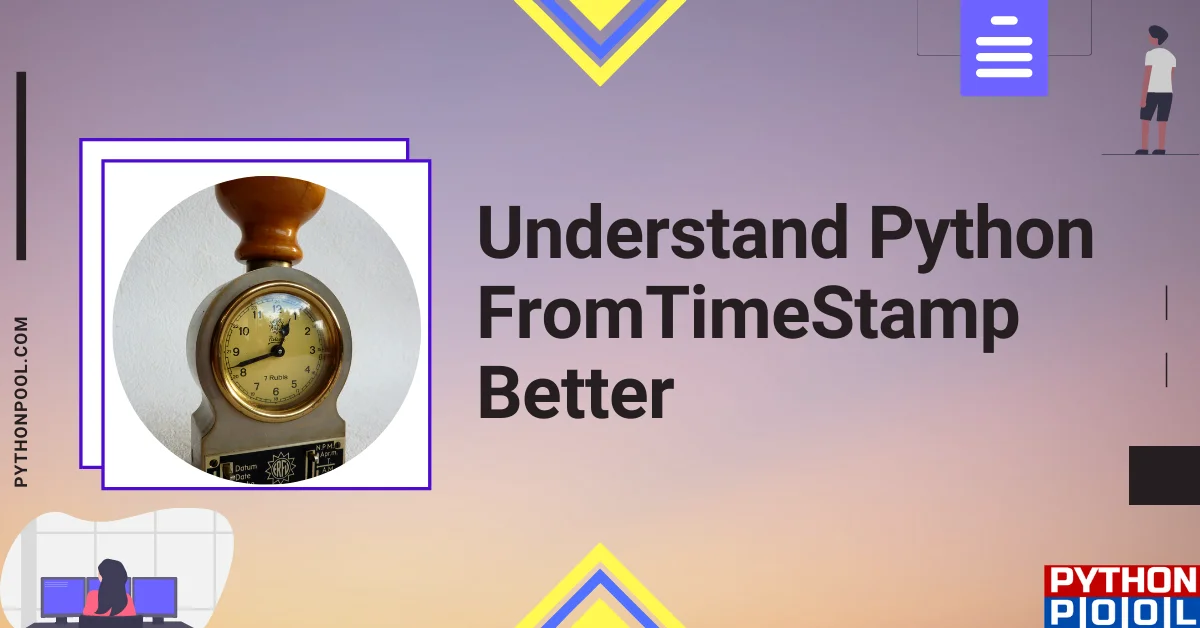Hello Geeks! Welcome back to another article, i.e., Python fromtimestamp(). So, this one comes from the python DateTime module. So today, in this article, first, we will take a quick overview of the python timestamp and then will see the fromtimestamp() method from the Date class. Let’s get started.
Python Timestamp
Now, once we have overviewed about Datetime Module, take a look at Python Timestamp. So, first, understand what timestamp is? So, a timestamp is encoded information for the time of any particular happening. Talking more convincingly, we can say that the timestamp refers to a group of encoded characters representing any particular date-time, including seconds. However, we don’t need to worry about encoding as python handles it. Now, the question is how to get a timestamp. A simple answer for this is that different modules have their methods to create a timestamp. For example:-
| Module | Methods |
|---|---|
| Time Module | time.time() |
| DateTime Module | datetime_obj.timestamp() |
| Calender | calender_obj.timegm() |
Example
#importing datetime class from datetime module.
from datetime import datetime
random_date = datetime(2010,11,12,13,14,15)
print(random_date)
ts = random_date.timestamp() # Converting date into timestamp
print(ts)
Output:
2010-11-12 13:14:15
1289567655.0Now, once we understand timestamp, let’s see the python fromtimestamp() method.
Also, See | Easily Convert Python Timedelta to Seconds
Python Fromtimestamp()
So, this function is from the DateTime class and Date class of the DateTime module. We can Access it as datetime.datetime.fromtimestamp() or datetime.date.fromtimestamp() respectively. What this function does is return the date corresponding to any particular timestamp. We need to pass the timestamp object as the argument of this function, and in return, it gives us the datetime object corresponding to the given timestamp.
Example 1:- Converting timestamp to Datetime Object
#importing datetime class from datetime module
from datetime import datetime
#Creating a timestamp
datetime_obj = datetime(2010,11,12,13,14,15)
print(datetime_obj)
ts = datetime_obj.timestamp() # Converting date into timestamp
print(ts)
# Converting timestamp to date
datetime_obj2 = datetime.fromtimestamp(ts)
print("Converted time stamp from datetime class",datetime_obj2)
Output:
2010-11-12 13:14:15
1289567655.0
Converted time stamp from datetime class 2010-11-12 13:14:15Example 2:- Converting timestamp to Date Object
#importing date class from datetime module
from datetime import date
#Creating a timestamp
datetime_obj = datetime(2010,11,12,13,14,15)
print(datetime_obj)
ts = datetime_obj.timestamp() # Converting date into timestamp
print(ts)
# Converting timestamp to date
date_obj = date.fromtimestamp(ts)
print("Converted time stamp from date class",date_obj)
Output:
2010-11-12 13:14:15
1289567655.0
Converted time stamp from date class 2010-11-12Example 3:- Python fromtimestamp for UTC
UTC stands for Universal Time Coordinated. It is the standard used by the international community to keep time. Let’s see how we can create a timestamp for that and then get a datetime object from that timestamp.
from datetime import datetime,timezone
# Getting the current date
# and time
dt = datetime.now(timezone.utc)
print("dt object datatype",type(dt))
print(dt)
# Converting datetime object
utc_timestamp = dt.timestamp()
print("Datatype of utc_timestamp",type(utc_timestamp))
print(utc_timestamp)
print(type(utc_timestamp))
#Converting timestamp to datetime object
datetime_obj2 = datetime.fromtimestamp(utc_timestamp)
print("Converted timestamp from datetime class",datetime_obj2)
Output:
dt object datatype <class 'datetime.datetime'>
2021-11-27 17:32:34.626788+00:00
Datatype of utc_timestamp <class 'float'>
1638034354.626788
<class 'float'>
Converted timestamp from datetime class 2021-11-27 17:32:34.626788Example 4:- Python fromtimestamp Set Timezone
#importing datetime class from datetime module
from datetime import datetime
import pytz
#Creating a timestamp
ACST = pytz.timezone('Australia/Darwin')
datetime_obj = datetime(1901,11,12,13,14,15, tzinfo=ACST)
print(datetime_obj)
ts = datetime_obj.timestamp() # Converting date into timestamp
print(ts)
print(type(ts))
# Converting timestamp to date
datetime_obj2 = datetime.fromtimestamp(ts,tz=ACST)
print("Converted time stamp from datetime class",datetime_obj2)
Output:
1901-11-12 13:14:15+08:43
-2150220525.0
<class 'float'>
Converted time stamp from datetime class 1901-11-12 13:14:15+08:43Example 5:- Python datetime fromtimestamp milliseconds
from datetime import datetime
time_in_millis = 1596542285000
datetime_obj = datetime.fromtimestamp(time_in_millis/1000)
print(datetime_obj)
Output:
2020-08-04 11:58:05Errors while using fromtimestamp()
Error: Python datetime fromtimestamp yielding valueerror year out of range
f = 1437506779950.0
print(datetime.fromtimestamp(float(f)))
Output:
---------------------------------------------------------------------------
ValueError Traceback (most recent call last)
<ipython-input-46-a7a81cc369c5> in <module>()
1 f = 1437506779950.0
2
----> 3 print(datetime.fromtimestamp(float(f)))
ValueError: year 47522 is out of range
The error is that we need to divide f to 1000 to convert milliseconds to seconds for computation.
f = 1437506779950.0
print(datetime.fromtimestamp(float(f)/1000))
Output:
2015-07-21 19:26:19.950000Error: Python fromtimestamp() method inconsistent
This error is occurred due to an inconsistent timezone defined while using the function. Here is the complete list of timezones.
Conclusion
So, today in this article, we took the overview of the Python Datetime module. Then we discussed different classes in that module. After that, we have seen what timestamps are and how we can create a timestamp. In the end, we have seen how we can convert a timestamp to a datetime and date object using the fromtimestamp() method from both classes.
I hope this article has helped you. Keep supporting. Thank You.

![[Fixed] typeerror can’t compare datetime.datetime to datetime.date](https://www.pythonpool.com/wp-content/uploads/2024/01/typeerror-cant-compare-datetime.datetime-to-datetime.date_-300x157.webp)
![[Fixed] nameerror: name Unicode is not defined](https://www.pythonpool.com/wp-content/uploads/2024/01/Fixed-nameerror-name-Unicode-is-not-defined-300x157.webp)
![[Solved] runtimeerror: cuda error: invalid device ordinal](https://www.pythonpool.com/wp-content/uploads/2024/01/Solved-runtimeerror-cuda-error-invalid-device-ordinal-300x157.webp)
![[Fixed] typeerror: type numpy.ndarray doesn’t define __round__ method](https://www.pythonpool.com/wp-content/uploads/2024/01/Fixed-typeerror-type-numpy.ndarray-doesnt-define-__round__-method-300x157.webp)